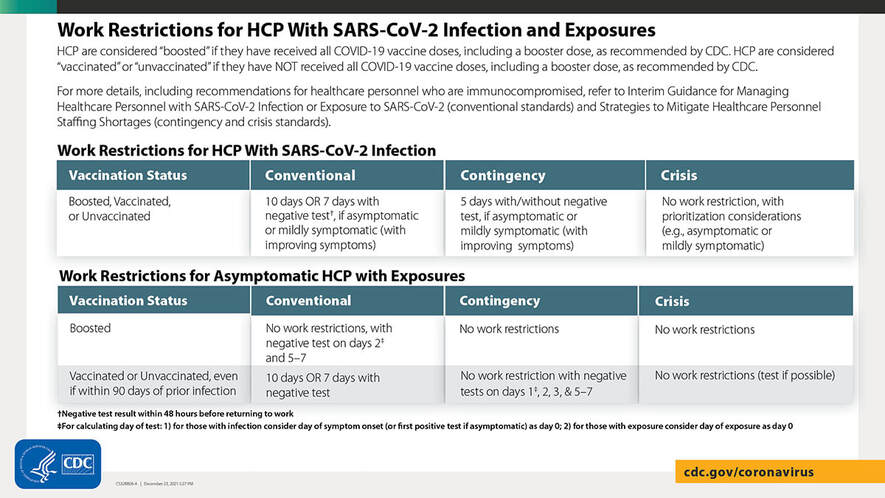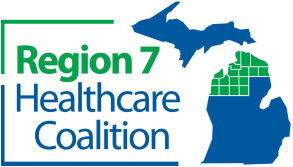For RMCC Emergency Assistance
|
If you need emergency assistance from Region 7 Healthcare Coalition, activate the Region 7 Medical Coordination Center by calling:
Gaylord Regional Communication Center: 1-989-732-5141 |
During your call, include the following information:
- Your name and contact number. - Your agency or hospital. - The reason for requesting the resource. - Exact location to where you need the resource delivered. - Who will accept and sign for the resource. |
For all other types of assistance call Amanda Reed at 989-370-5013 or Lindsay Meisner at 989-370-3583
COVID-19 Vaccines
Please reach out to your local Health Department for information on vaccines and scheduling vaccination appointments. To find your local Health Department, click here.
COVID-19 Resources from Partner Briefings
To access resources discussed during partner meetings, please click the following link to access our public Google drive. This will be the central location to access all resources discussed during meetings.
Coronavirus Mental Health Resources
Michigan.gov/Coronavirus Mental Health Resources - The Michigan Department of Health and Human Services has provided resources for those who are struggling with their mental and emotional wellbeing during the Coronavirus pandemic. On this page you will find resources for children and adults as well as the new Stay Well Summer Resilience Series. This is a series of webinars devoted to practices that help strengthen mental resilience. Additionally, the Michigan Stay Well program presents a free interactive learning series for parents and their kids (age 2 to 10) called Draw Your Feelings! Helping your Child Grow Emotionally Through Art.
COVID-19 Resources
For the most up to date information on the Coronavirus Disease (COVID-19)
please see the links below.
Person Under Investigation (PUI) / Case Report Form Cover Sheet
please see the links below.
Person Under Investigation (PUI) / Case Report Form Cover Sheet
CDC Updates and Resources
12/23/21 Updated CDC Guidance on Managing Healthcare Personnel with SARS-CoV-2 Infection or Exposure
On December 23, due to concerns about increased transmissibility of the SARS-CoV-2 Omicron variant, CDC updated their health care provider exposure guidance to enhance protection for healthcare personnel (HCP), patients, and visitors, and to address concerns about potential impacts on the healthcare system given a surge of SARS-CoV-2 infections. These updates will be refined as additional information becomes available to inform recommended actions.
A summary table of work restrictions for healthcare providers with SARS-CoV-2 infection or exposure is attached.
The complete CDC guidance can be found at https://www.cdc.gov/coronavirus/2019-ncov/hcp/guidance-risk-assesment-hcp.html
Key changes to the guidance include:
A summary table of work restrictions for healthcare providers with SARS-CoV-2 infection or exposure is attached.
The complete CDC guidance can be found at https://www.cdc.gov/coronavirus/2019-ncov/hcp/guidance-risk-assesment-hcp.html
Key changes to the guidance include:
- Ensure that SARS-CoV-2 testing is performed with a test that is capable of detecting SARS-CoV-2, even with currently circulating variants in the United States.
- Updated recommendations regarding when HCP with SARS-CoV-2 infection could return to work.
- The definition of higher-risk exposure was updated to include use of a facemask (instead of a respirator) by HCP if the infected patient is not also wearing a facemask or cloth mask.
- Added options that would allow asymptomatic HCP with a higher-risk exposure who have not received all COVID-19 vaccine doses, including booster dose, as recommended by CDC to return to work prior to the previously recommended 14-day post-exposure period of work restriction, assuming they do not develop symptoms or test positive for SARS-CoV-2.
Below is syndicated content from the CDC website with current information regarding COVID-19.
This information can also be found using the CDC link above.
Guidance includes information for dialysis, cleaning and disinfecting, lab specimens, local health departments, and guidance for schools and higher education facilities.
This information can also be found using the CDC link above.
Guidance includes information for dialysis, cleaning and disinfecting, lab specimens, local health departments, and guidance for schools and higher education facilities.



